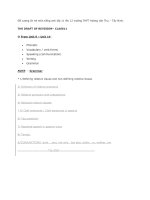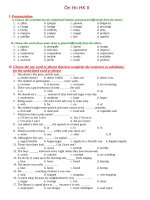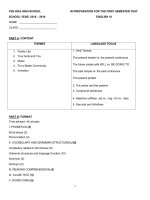Đề cương vấn đáp nói tiếng Anh 4 Ehou bản đầy đủ
Bạn đang xem bản rút gọn của tài liệu. Xem và tải ngay bản đầy đủ của tài liệu tại đây (73.4 KB, 5 trang )
<span class="text_page_counter">Trang 1</span><div class="page_container" data-page="1">
<b>Task 1</b>
<b>HOMETOWN 1</b>
1. Which part of the country are you living now?
2. Do youngsters in your town spend much their free time taking outdoor activities?3. What jobs do the local people do?
4. What do you like most about your hometown
1. I'm currently living in the northern part of the country, specifically in Hanoi. This city is known for its rich history and vibrant culture.
2. Yes, youngsters in my town spend much of their free time engaging in outdoor activities. They often exercise, run, and swim to stay fit and healthy.
3. Local people in my area do a variety of jobs. For example, many work as doctors, teachers, and business owners, contributing to the community's diverse economy.
4. What I like most about my hometown is its bustling atmosphere. There are always many activities and events happening, making it an exciting place to live.
<b>HOMETOWN 2</b>
1. Where are you living now?
2. What do the local residents often do in their free time?3. What are their popular jobs?
4. Are all young people in your hometown go to university after school?
1. I am currently living in Hanoi. This vibrant city in northern Vietnam is known for its rich culture, bustling streets, and historical landmarks.
2. Local residents often spend their free time jogging, watching movies, and participating in various recreational activities that help them relax and stay entertained.
3. In Hanoi, popular jobs include working in education, healthcare, business, and technology. Many people are employed as teachers, doctors, entrepreneurs, and IT professionals.
4. Nearly all young people in my hometown go to university after finishing school. However, many also pursue vocational training, start businesses, or seek opportunities abroad.
</div><span class="text_page_counter">Trang 2</span><div class="page_container" data-page="2"><b>FAMILY 1</b>
1. Which city are you from?2. Do you have a large family?3. What does your mother do?
4. How much time do you spend with your family?
1. I am from Hanoi, a lively city in northern Vietnam. It is known for its beautiful lakes, ancient temples, and bustling markets.
2. My family is quite large. Four generations live together in one house, making it a lively and busy home.
3. My mother is retired now. Before retiring, she worked as a hotel employee, providing excellent service to guests.
4. As a doctor, I don't have much time for my family due to work, studies, and shifts. I usually spend 3-4 hours a day with them.
<b>FAMILY 2</b>
1. Which province do you come from?2. Do you live with your family
3. What is your father’s job?
4. Do you prefer going out with your family or your friends
1. I come from Hanoi, a bustling city in northern Vietnam. It's a province known for its rich culture,history, and vibrant street life.
2. Yes, I live with my extended family. Four generations share the same house, creating a lively and supportive home environment.
3. My father is retired now. Before his retirement, he worked as a police officer, serving and protecting our community.
4. I prefer spending time with my family. After work, I often decline social outings with friends to be with my family, cherishing those moments.
<b>FAMILY 3</b>
1. Where are you from?
2. Were you born in a large or a small family?3. Who is important to you in your family?
4. How often do your family members eat out together?
1. I am from Hanoi, a vibrant and historical city in northern Vietnam known for its rich culture, bustling streets, and beautiful lakes.
2. I was born into a large family. I am the second child, with an older sister, and we live in a generation household.
four-3. Everyone in my family is important to me. Each member supports and stands by me in different circumstances. Most importantly, my wife is the person who shares and experiences life with me.4. We eat out together very often. On special occasions, we usually enjoy hotpot or seafood,
making these meals a family tradition.
</div><span class="text_page_counter">Trang 3</span><div class="page_container" data-page="3">Secondly, TV ads often present unrealistic body images and lifestyles. Advertisements frequently feature perfect-looking models and luxurious settings, distorting young viewers' perceptions of reality. This can lead to low self-esteem and body image issues, as young people compare themselves to these unattainable standards.
Lastly, TV advertisements can distract from important activities. Constant exposure to ads reduces timespent on productive pursuits like studying, reading, or exercising. For example, instead of focusing on their education or hobbies, young people might spend hours watching TV and absorbing its ads.In conclusion, TV advertisements foster consumerism, promote unrealistic standards, and distract young people from valuable activities, making them significantly disadvantageous for the young generation.
<b>EXPLORATION and DISCOVERY</b>
<b>“Discuss THREE most beneficial THINGS which travelling may bring to travelers worldwide”</b>
Traveling offers several valuable benefits to travelers worldwide. Firstly, it fosters personal growth and self-discovery. Through exploration, individuals gain new insights about themselves, their values, and aspirations. Experiencing diverse cultures and environments encourages introspection and broadens perspectives, leading to enhanced self-awareness and personal development.
Secondly, traveling promotes cultural understanding and empathy. Immersing oneself in different cultures fosters appreciation for diversity and encourages tolerance and respect for others' customs and beliefs. By engaging with locals and experiencing their way of life, travelers gain a deeper
understanding of global interconnectedness and the richness of human experiences.
Lastly, traveling provides opportunities for lifelong learning and enrichment. Whether exploring historical landmarks, natural wonders, or engaging in local traditions, travel offers educational
experiences that cannot be replicated in classrooms. Travelers gain valuable knowledge about history, geography, and social dynamics, enriching their understanding of the world and fostering a lifelong curiosity for learning.
In conclusion, traveling enriches lives by promoting personal growth, cultural understanding, and lifelong learning. These benefits make exploration and discovery through travel a rewarding and transformative experience for travelers worldwide.
</div><span class="text_page_counter">Trang 4</span><div class="page_container" data-page="4">Secondly, globalization enhances cultural exchange and understanding. Increased interconnectedness through trade, travel, and communication allows people to share ideas, values, and traditions across borders. This fosters mutual respect, appreciation for diversity, and the celebration of cultural heritage. By experiencing different cultures, individuals develop empathy and a broader worldview, leading to more inclusive and tolerant societies.
Lastly, globalization drives technological innovation and progress. The exchange of knowledge, ideas, and technology across borders accelerates scientific advancements and technological breakthroughs. This leads to improvements in healthcare, education, communication, and infrastructure, enhancing quality of life and promoting human development. Access to information and technology empowers individuals to pursue education, entrepreneurship, and innovation, unleashing their full potential and contributing to global progress.
In conclusion, globalization brings valuable advantages such as economic growth, cultural exchange, and technological innovation. These benefits contribute to a more interconnected, prosperous, and inclusive world, enriching the lives of people in the modern era.
<b>“Discuss THREE most notable EFFECTS which money may have on the human’s life”</b>
Money has several notable effects on human life. Firstly, it influences lifestyle and standard of living. With money, individuals can afford basic necessities like food, shelter, and healthcare, as well as luxuries such as travel, entertainment, and material possessions. The availability of money impacts where people live, the type of education they receive, and the quality of healthcare they access, shapingtheir overall quality of life.
Secondly, money affects mental and emotional well-being. Financial stability can alleviate stress and anxiety, providing a sense of security and peace of mind. However, the pursuit of wealth can also lead to stress, greed, and dissatisfaction if not balanced with other aspects of life. Moreover, financial struggles can cause mental health issues and strain relationships, highlighting the significant impact of money on human happiness and emotional health.
Lastly, money influences social status and relationships. Wealth can afford individuals social privilegesand opportunities, such as access to exclusive clubs, networks, and events. However, it can also create disparities and divisions within society, leading to social inequality and resentment. Moreover, money can affect personal relationships, as financial differences may cause tension or imbalance in power dynamics.
In conclusion, money has notable effects on human life, including its influence on lifestyle, well-being, and social dynamics. While it provides opportunities for comfort and security, it also carries risks and challenges that must be navigated in pursuit of a balanced and fulfilling life.
</div><span class="text_page_counter">Trang 5</span><div class="page_container" data-page="5">performance, social relationships, and overall well-being. Young people may struggle to disconnect from the online world, leading to decreased productivity, sleep disturbances, and withdrawal symptomswhen offline.
Secondly, the internet exposes young people to various online risks and dangers. Cyberbullying, online predators, and exposure to inappropriate content are prevalent concerns. Social media platforms
amplify peer pressure, comparison, and feelings of inadequacy, contributing to mental health issues likeanxiety, depression, and low self-esteem. Moreover, young people may fall victim to online scams, fraud, and identity theft, highlighting the importance of digital literacy and online safety education.Lastly, the internet can hinder face-to-face communication and social skills development. Excessive reliance on digital communication platforms like texting and messaging can diminish the ability to engage in meaningful, in-person interactions. Young people may struggle with effective
communication, empathy, and understanding non-verbal cues, impacting their relationships and interpersonal skills in real-life settings.
In conclusion, while the internet offers numerous benefits, it also presents significant disadvantages for the young generation, including addiction, online risks, and hindrance to social skills development. Addressing these challenges requires promoting digital literacy, fostering healthy online habits, and providing support for mental and social well-being in the digital age.
</div>








